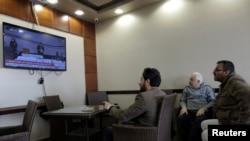After more than a year, Libyan parties on Friday agreed to a transitional government tasked with guiding them to national elections at the end of this year.
“It is absolutely essential to unify Libya and to move onwards on the way to peace,” U.N. Secretary-General Antonio Guterres told a news conference in New York. “The elections of course, being a key element of that way to peace.”
At the end of a weeklong in-person meeting of the Libyan Political Dialogue Forum at the United Nations in Geneva, a new executive authority was elected after two rounds of voting.
“Our bet was that you would be able to build a truly Libyan-owned solution,” said Stephanie Williams, the United Nations’ acting envoy in Libya, who has been the facilitator for the parties.
She commended the parties for overcoming their many differences and divisions and putting the interests of Libya and its people first.
Williams said the winning ticket received 39 of 73 ballots cast. The new executive will be made up of a presidency council and a prime minister.
Three weeks to form cabinet
Prime Minister-designate Abdul Hamid Mohammed Dbeibah now has 21 days to form his cabinet and present its work program to the country’s House of Representatives for full endorsement.
The transitional government has a daunting to-do list ahead of it, including meeting the December 24, 2021, date for national elections. Williams said 77% of Libyans say they want elections to go ahead on that date.
According to a national road map, the new executive must also launch a national reconciliation process, implement a cease-fire agreement and tackle the country’s severe economic crisis.
Members of the caretaker government are not allowed to run for office in the December elections.
Cease-fire
In October, a cease-fire was signed between the two main parties — the Tripoli-based Government of National Accord and the forces of General Khalifa Haftar’s Libyan National Army (LNA).
“So now we have a cease-fire, we have a political agreement about elections, we have a new transitional authority going to be put in place,” the U.N. chief said. “It is essential that all foreign fighters and mercenaries move first to Tripoli and Benghazi, and then leave the country according to the new schedule that was defined.”
Mercenaries and fighters from Russia and Turkey have been involved in prolonging the conflict in oil-rich Libya. Other nations, including the United Arab Emirates and Egypt, have intervened, sending large amounts of weapons and air support.
Libya fell into internal armed conflict after the ousting and assassination of former dictator Moammar Gadhafi in October 2011. The country has gone through cycles of violence, including having land and oil fields seized by terrorist groups, and the latest escalation, which began in April 2019, when Haftar’s LNA moved on Tripoli.
Libya’s deteriorating health care system has also been battling rising numbers of COVID-19 cases.





